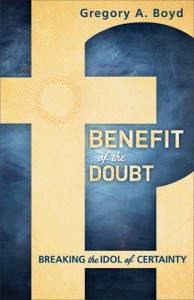
Gregory Boyd’s Benefit of the Doubt is an intriguing look at the role of doubt in the life of faith. Boyd gives us a hefty dose of original thinking and a helpful critique of the evangelical world that is long overdue. With a couple of important caveats (see below), Boyd’s book is recommended reading for anyone who has intellectual questions about Christianity and struggles with doubt.
Boyd begins his book by critiquing the idea that in order for us not to doubt, we must have certainty. He relates the story of a time he and others were praying for the healing of a church member, and how he tried to make himself believe that the person would be healed. Boyd tried to do this because he was taught that, if indeed he was certain his friend would be healed, God would heal him. Boyd critiques this view as a type of magic, a way to manipulate God into doing something because of something we do (in this case, believe the right thing). This is a type of idolatry, Boyd says, because the focus is on the beliefs themselves, not on God. That is, the focus is on the belief a person will be, or should be healed, rather than on God. This kind of focus puts a tremendous amount of pressure on the person doing the praying. If the sick person isn’t healed, it’s because the person praying didn’t have enough faith.
Boyd also has an interesting critique of the way many evangelicals believe doctrine. He calls it a “house of cards” faith in which all of the doctrines go together as one package. If one doctrine is taken out, or even doubted, the whole house of cards crumbles. Boyd relates the story of his own struggles understanding certain Bible passages or how faith and science go together, and how he lost his faith several times since he thought that he had to believe every doctrine proffered in order to be a Christian. When he began to doubt that the days in Genesis were literal days for example, his house of cards crumbled and he became an agnostic again.

One of the most helpful parts of the book is Boyd’s argument for a covenantal faith instead of a contractual faith. In a covenantal faith, like a marriage, the focus is on the other person—loving and serving them. A contractual faith is a faith focused on the contract, much like a marriage in which the focus is not the other person, but the fact that a binding contract was entered into. Boyd shares a tragic story of a marriage that ended partly because one of the spouses was certain because of the contract of the marriage, the other person wouldn’t leave. He then goes on to declare that, in a covenantal faith, one can continue to believe in and serve the Lord while one works out doubts, because the focus in a such a faith is not on a set of beliefs, but a person.
Boyd gets into trouble, however, in chapter 9. Here he argues that the entire Bible is not authoritative in terms of knowing God’s character. He says that in fact the Old Testament is not authoritative in terms of knowing God because it’s pre-Christ. He declares we must “place Jesus’ revelation above all previous revelations,” and “we can only understand the previous revelation through the lens of this one.” While this sounds good on the surface, it is difficult to see how Boyd can square this with his belief in the inspiration of scripture, discussed in chapter 8. And in fact, this view is reminiscent of the Marcionite heresy, in which the God of the Old Testament is not the same as the God of the New Testament. Boyd stops short of saying this, instead claiming that, in the Old Testament, God stooped to the violent and legalistic ways of the ancient world so people could understand him. All this is highly problematic, however, and leads, it seems to me, to a view that the Old Testament is quite inferior to the New. What is the point of even having the OT in our Bibles, if we can’t trust the portrait of God written there? It also seems to lead Boyd away from inerrancy, believing instead that the scriptures have “some limitations, imperfections and faults.” While this may have appeal to some as a line of reasoning, it’s again difficult to see how Boyd squares it with the doctrine of inspiration he claims to embrace in chapter 8.
Nevertheless, there is a lot of good in Boyd’s book. His discussion of different verses that are used to claim we should never doubt is very helpful, as well as his discussion of the book of Job and his focus on wrestling with God. For those of us who doubt our faith from time to time, he has given us a very helpful framework for continuing in our faith while we wrestle with the Lord.
Image courtesy of Unsplash at Pixabay.com
Mark is on staff with InterVarsity Christian Fellowship in Manhattan, Kansas, where he ministers to Faculty at Kansas State University and surrounding campuses. He has been in campus ministry 25 years, 14 of those years in faculty ministry. He has a Master’s degree in philosophy and theology from Talbot School of Theology, La Mirada, CA, and is passionate about Jesus Christ and the life of the mind. Mark, his wife and three daughters make their home in Manhattan.

Thank you for this helpful review of a book I have found eyeopening, even ground-breaking; however, while chapter 9 made me squirm a little more than the others, as I read it he is not saying that the OT is not authoritative, he is saying it is not all equally authoritative, giving a number of examples to support what he proposes. I think that’s a different point, and one I’m personally more comfortable with.